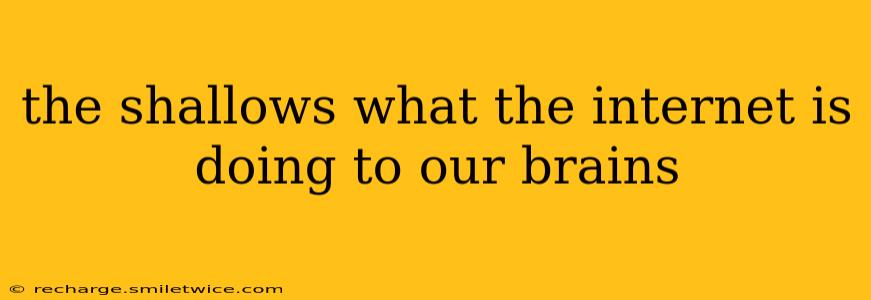Nicholas Carr's "The Shallows: What the Internet Is Doing to Our Brains" sparked a crucial conversation about the impact of the internet on our cognitive abilities. While the book generated considerable debate, its core message remains relevant: the internet, while undeniably beneficial, profoundly alters how we think and process information. This exploration delves into the key arguments of Carr's work and addresses some frequently asked questions surrounding the topic.
Is the Internet Rewiring Our Brains?
This is arguably the central question of Carr's book. He argues that the internet's hypertextual nature, characterized by constant distractions and rapid switching between tasks, is fundamentally reshaping our neural pathways. Our brains, he suggests, are adapting to this fragmented environment, prioritizing speed and superficial engagement over deep processing and focused attention. This isn't to say our brains are literally being "rewired" in a physical sense, but rather that the patterns of neural activity are being altered, leading to changes in cognitive function. The constant stimulation and rapid shifts between different information sources train our brains to favor skimming and multitasking over sustained concentration and in-depth analysis.
Does the Internet Affect Our Attention Span?
Yes, there's considerable evidence suggesting the internet negatively impacts attention span. The constant stream of notifications, emails, and updates cultivates a state of perpetual partial attention. We’re constantly bombarded with stimuli, making it challenging to maintain focus on a single task for an extended period. This fragmented attention affects not only our ability to concentrate on complex tasks but also our ability to engage with information deeply and critically. The result is a decrease in our capacity for sustained concentration and a preference for easily digestible content.
How Does the Internet Impact Our Memory?
Carr argues that the internet's readily available information reduces our reliance on memory. Why strain our brains to remember facts when we can instantly access them online? This constant reliance on external memory sources, he suggests, can weaken our internal memory capabilities. While research on this specific point is ongoing and complex, the potential for a decline in working memory and the associated ability to synthesize information remains a valid concern. We may become highly skilled at searching and retrieving information, but our ability to store and retrieve information independently may suffer.
Can the Internet Improve Our Cognitive Abilities?
While Carr highlights potential negative effects, it's crucial to acknowledge the internet's positive contributions. It provides access to a vast repository of knowledge, facilitates communication and collaboration, and offers opportunities for lifelong learning. The key lies in how we use the internet. Mindful engagement, conscious efforts to limit distractions, and deliberate practice of deep thinking skills can mitigate the potential downsides and harness the internet's cognitive benefits.
What Can We Do to Protect Our Brains from the Negative Effects of the Internet?
This is a crucial question. Several strategies can help:
- Mindful internet use: Be conscious of your online habits. Schedule dedicated time for focused tasks, turn off notifications, and resist the urge to constantly check social media or email.
- Embrace deep work: Dedicate time each day to activities requiring focused attention, such as reading, writing, or problem-solving, without digital distractions.
- Practice mindfulness and meditation: These practices can enhance attention span and improve cognitive control.
- Digital detox: Regularly disconnect from the internet to allow your brain to rest and recover.
The internet is a powerful tool, and its impact on our brains is complex and multifaceted. Rather than viewing it as purely positive or negative, we need to understand its effects and develop strategies for using it mindfully and productively, fostering a healthier relationship with technology and preserving our cognitive abilities. The conversation sparked by "The Shallows" continues to evolve, demanding our ongoing critical examination and responsible engagement with the digital world.
